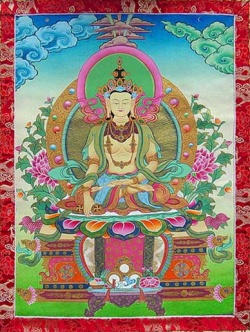Chappana Sutta
Chappana Sutta: The Six Animals
translated from the Pali by
Thanissaro Bhikkhu
"Suppose that a man, wounded and festering, were to go into a swampy jungle. Its sharp-bladed grasses would pierce his feet; its thorns would scratch his festering sores. And so, from that cause, he would experience an even greater measure of pain and unhappiness. In the same way, there is the case where a certain monk, having gone to a village or to the wilderness, meets up with someone who upbraids him: 'This venerable one, acting in this way, undertaking practices in this way, is a thorn of impurity in this village.' Knowing this person to be a thorn, one should understand restraint and lack of restraint.
"And what is lack of restraint? There is the case where a monk, seeing a form with the eye, is obsessed with pleasing forms, is repelled by unpleasing forms, and remains with body-mindfulness unestablished, with limited awareness. He does not discern, as it actually is present, the awareness-release, the discernment-release where any evil, unskillful mental qualities that have arisen utterly cease without remainder.
"Hearing a sound with the ear...
"Smelling an aroma with the nose...
"Tasting a flavor with the tongue...
"Touching a tactile sensation with the body...
"Cognizing an idea with the intellect, he is obsessed with pleasing ideas, is repelled by unpleasing ideas, and remains with body-mindfulness unestablished, with limited awareness. He does not discern, as it actually is present, the awareness-release, the discernment-release where any evil, unskillful mental qualities that have arisen utterly cease without remainder.
"Just as if a person, catching six animals of different ranges, of different habitats, were to bind them with a strong rope. Catching a snake, he would bind it with a strong rope. Catching a crocodile... a bird... a dog... a hyena... a monkey, he would bind it with a strong rope. Binding them all with a strong rope, and tying a knot in the middle, he would set chase to them.
"Then those six animals, of different ranges, of different habitats, would each pull toward its own range & habitat. The snake would pull, thinking, 'I'll go into the anthill.' The crocodile would pull, thinking, 'I'll go into the water.' The bird would pull, thinking, 'I'll fly up into the air.' The dog would pull, thinking, 'I'll go into the village.' The hyena would pull, thinking, 'I'll go into the charnel ground.' The monkey would pull, thinking, 'I'll go into the forest.' And when these six animals became internally exhausted, they would submit, they would surrender, they would come under the sway of whichever among them was the strongest. In the same way, when a monk whose mindfulness immersed in the body is undeveloped & unpursued, the eye pulls toward pleasing forms, while unpleasing forms are repellent. The ear pulls toward pleasing sounds... The nose pulls toward pleasing aromas... The tongue pulls toward pleasing flavors... The body pulls toward pleasing tactile sensations... The intellect pulls toward pleasing ideas, while unpleasing ideas are repellent. This, monks, is lack of restraint.
"And what is restraint? There is the case where a monk, seeing a form with the eye, is not obsessed with pleasing forms, is not repelled by unpleasing forms, and remains with body-mindfulness established, with immeasurable awareness. He discerns, as it actually is present, the awareness-release, the discernment-release where all evil, unskillful mental qualities that have arisen utterly cease without remainder.
"Hearing a sound with the ear...
"Smelling an aroma with the nose...
"Tasting a flavor with the tongue...
"Touching a tactile sensation with the body...
"Cognizing an idea with the intellect, he is not obsessed with pleasing ideas, is not repelled by unpleasing ideas, and remains with body-mindfulness established, with immeasurable awareness. He discerns, as it actually is present, the awareness-release, the discernment-release where all evil, unskillful mental qualities that have arisen utterly cease without remainder.
"Just as if a person, catching six animals of different ranges, of different habitats, were to bind them with a strong rope. Catching a snake, he would bind it with a strong rope. Catching a crocodile... a bird... a dog... a hyena... a monkey, he would bind it with a strong rope. Binding them all with a strong rope, he would tether them to a strong post or stake.
"Then those six animals, of different ranges, of different habitats, would each pull toward its own range & habitat. The snake would pull, thinking, 'I'll go into the anthill.' The crocodile would pull, thinking, 'I'll go into the water.' The bird would pull, thinking, 'I'll fly up into the air.' The dog would pull, thinking, 'I'll go into the village.' The hyena would pull, thinking, 'I'll go into the charnel ground.' The monkey would pull, thinking, 'I'll go into the forest.' And when these six animals became internally exhausted, they would stand, sit, or lie down right there next to the post or stake. In the same way, when a monk whose mindfulness immersed in the body is developed & pursued, the eye does not pull toward pleasing forms, and unpleasing forms are not repellent. The ear does not pull toward pleasing sounds... The nose does not pull toward pleasing aromas... The tongue does not pull toward pleasing flavors... The body does not pull toward pleasing tactile sensations... The intellect does not pull toward pleasing ideas, and unpleasing ideas are not repellent. This, monks, is restraint.
"The 'strong post or stake' is a term for mindfulness immersed in the body.
"Thus you should train yourselves: 'We will develop mindfulness immersed in the body. We will pursue it, hand it the reins and take it as a basis, give it a grounding. We will steady it, consolidate it, and set about it properly.' That's how you should train yourselves."

